Exhibiting defensive behavior is a very common thing, especially in relationships. For most people, it just takes one word or one statement to get defensive about themselves and their viewpoints.
“My partner is too defensive” is a common complaint I hear as a couples therapist.
Of course, we are all wired to protect ourselves — so most of us get defensive at least sometimes. But if you find that either you or your partner is always on guard, waiting on the front-lines to pounce into a defensive mode of communicating, it can be deeply harmful to the relationship.
Here are 12 truths about defensiveness — what it is and why it happens — that can help us better understand this self-protecting impulse (and especially when it gets precarious).
In understanding defensiveness better, we can learn to dismantle it as a habit, and begin engaging more compassionately and openly in our relationships.
Here Are 12 Truths About Defensive Behavior
1. There are several ways to define the term defensive.
My favorite is by author Sharon Ellison: to be defensive is to react with “a war mentality to a non-war issue.”
In other words, defensiveness is an impulsive and reactive mode of responding to a situation or conversation. Rather than listening with an open heart, we respond with our metaphorical shields up and weapons drawn.
2. All relationships experience hiccups now and again.
Be they with a lover, a child, your mother, or a co-worker, all relationships will inevitably suffer at some points from a breakdown in communication.
Your husband forgets to pass along a message, your wife forgets to pick up milk at the store, or your partner says something that inadvertently hurts your feelings.
Getting defensive in response to disruptions like these in your relationship is natural. But it’s all about your recovery time: holding onto a defensive attitude is a decidedly different way of approaching your relationship than recognizing that you’re being defensive and letting it go.
Related: How to Listen Without Getting Defensive
3. When issues come up, someone needs to protest.
If your partner forgets to call, you need to express how you feel. Saying, “I’m upset you didn’t call when you said you would” is not defensive, but open and honest. It gives your partner the benefit of the doubt, allowing, in the best of circumstances, for he/she to repair the situation with a simple, “I’m sorry. How can I make this situation better?” or “What would you prefer I do next time?”
4. Conflict allows for reconnection (and more).
The two steps of an “ideal conflict” that I explain about — protest and repair — also build faith in the resiliency of the relationship.
Working through conflicts explicitly and openly assure both partners that they can trust each other; they can be honest and acknowledge that any relationship is a work in progress, not fixed or defined on just one person’s terms.
The “conflict cycle” goes like this: connect, rupture, protest, repair, and reconnect. Remember, when it comes time to protest, be sure your complaint is stated considerately enough not to punish or shame your loved one.
5. Not speaking up is dangerous.
Bottom line: If we don’t learn how to deal with our grievances head-on, inevitably we deal with them indirectly, most often in more toxic forms: by teasing or making snide comments, holding grudges, or by growing more indifferent to our partner over time.
Of course, it’s difficult to give and receive healthy criticism if we’re clinging to a defensive attitude. If you feel yourself become defensive, try to see if you can simply acknowledge it, and work through the conflict as honestly and generously as possible. If your partner is giving you criticism that is making you feel defensive, can you express why?
Want to know more about the truths about defensive behavior? Check this video out below:
6. Our brains are wired for connection.
In the first stage of love, when we’re infatuated by the freshness and excitement of new romance, we anticipate the best in our new partner.
And we’re rewarded because each thing they say and do activates the connection center of our brain. We view their actions, intentions, and language through the lens of our positive vision.
As the chemistry of the “honeymoon phase” shifts, the second kind of circuitry emerges, one that is about sustainable connection.
That said, it turns out that we’re wired for self-protection as well. So in times of defensiveness, see if you can tap into our naturally coexistent desire to connect. Remember the enduring connection from that first stage of love, and try to access the feelings that first made you predisposed toward generosity and understanding at the outset of your relationship.
7. Withdrawal is not actually a great way to protect ourselves.
When we experience our partner as a threat, we withdraw to protect ourselves from further injury. Yet withdrawal and disconnection are what continue to create trouble.
At the heart of our vulnerability lies the feeling that we’ve lost our best friend. Our hearts and body ache for their return.
Yet our behavior often is the last thing that would invite them back. So when you least feel like reaching out to connect, take a risk, and try it; the results will pay off (much more than isolating yourself).
Related: The 11 Fights Every Couple Must Conquer to Have a Strong Marriage
8. Books about communication don’t do a great job at teaching us to receive criticism.
Sure, books on healthy relationships often emphasize the importance of expressing anger and complaints, but seldom do they tell us how to cope with being on the receiving end.
How do you sit calmly and quietly while your partner laments that you’re neither emotionally available nor trustworthy? How do you silence your inner lawyer’s constant stream of counterarguments? Ask yourself these questions, even if your self-help books aren’t.
9. Your response to criticism depends on several factors.
Namely: Temperament, history, and self-esteem. Keep this in mind. Some people have nervous systems that respond more frequently and intensely to sensory stimulation.
They may have a more exaggerated startle response than other people do, even in the same family. Often their bodies remain on high alert, and they perpetually scan the environment for danger. They may often hear themselves described as “too sensitive” or “thin-skinned.”
People who are more prone to defensiveness may perceive an attack in certain situations in which people with resilient and calm temperaments would perceive none. Experiment with viewing the situation from different vantage points.
10. Your childhood history has a lot to do with how you respond to criticism.
If your parents shamed you often and punished you harshly, it’s likely that, as an adult, you quickly feel self-protective whenever you see someone upset and angry about something.
The reasons for defensiveness are myriad and important to understand, but they don’t take away the need to learn how to rewire ourselves away from the impulse to immediately self-protect.
11. Resentment doesn’t do us any good.
The cost to our intimate relationships when we aren’t willing to protest (whether out of fear, self-doubt, an impulse to people-please, and so on) is that we literally make it impossible for the issues in the relationship to heal.
The relationship begins to smolder with resentments that undermine us in ways they wouldn’t if expressed freely in the first place. Remember this when you’re thinking of burying issues under the rug instead of dealing with them.
Related: 43 Pieces of Best Marriage Advice by Top Relationship Experts
12. Our love connections are all spiritual practices.
Relationships give us opportunities to grow in ways that make us more loving, accepting, and whole. Learning to hear our partner’s complaints with curiosity and openness not only deepens the connection between us but helps us be more open in all of our relationships.
Share your thoughts on the truths about defensive behavior in the comments below!
Written By Linda Carroll MS, LMFT, BCC Originally Appeared on LindaaCarroll.com
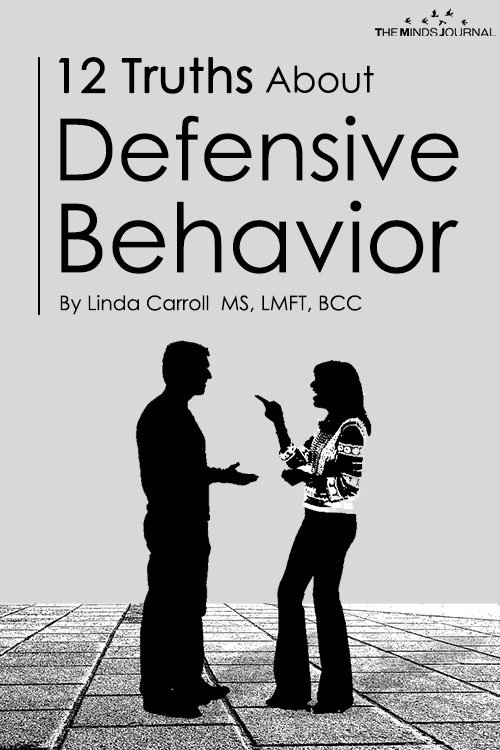
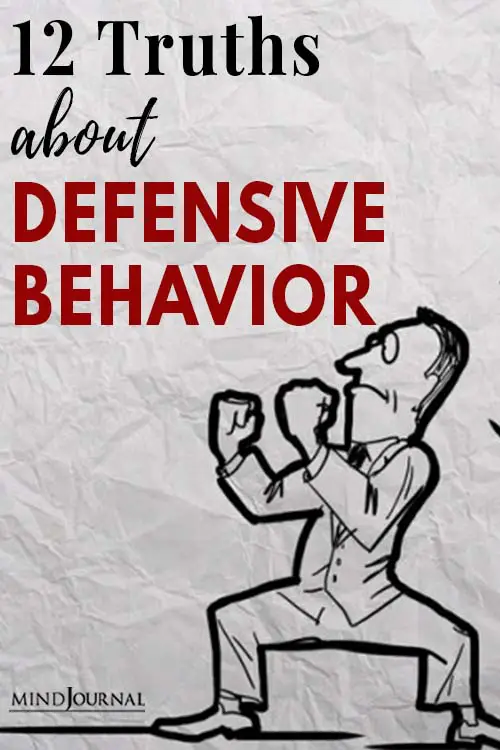
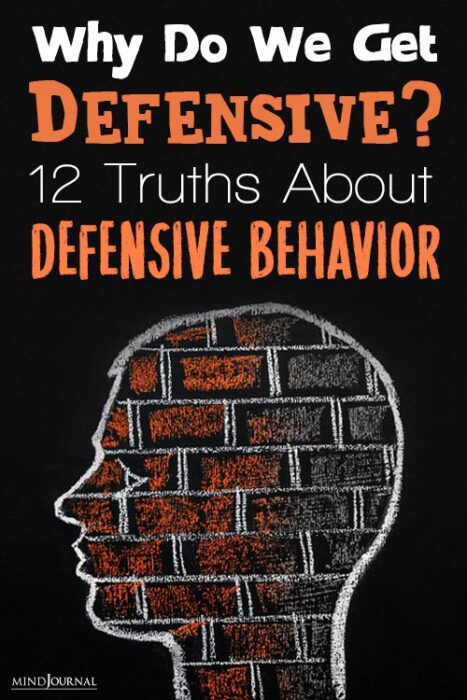
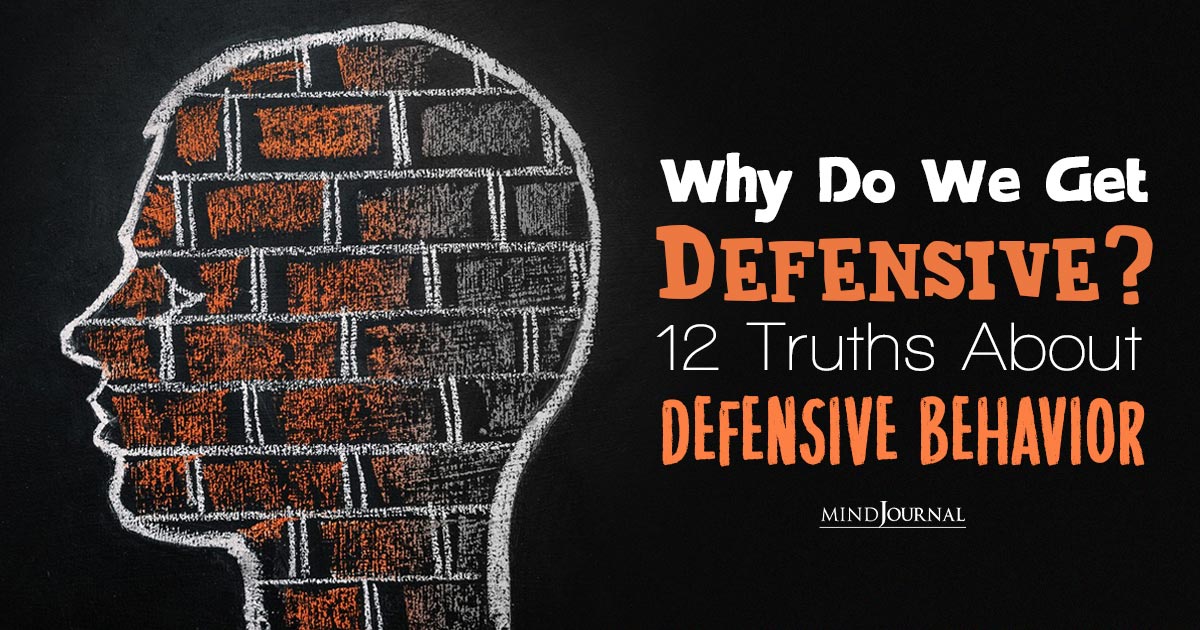





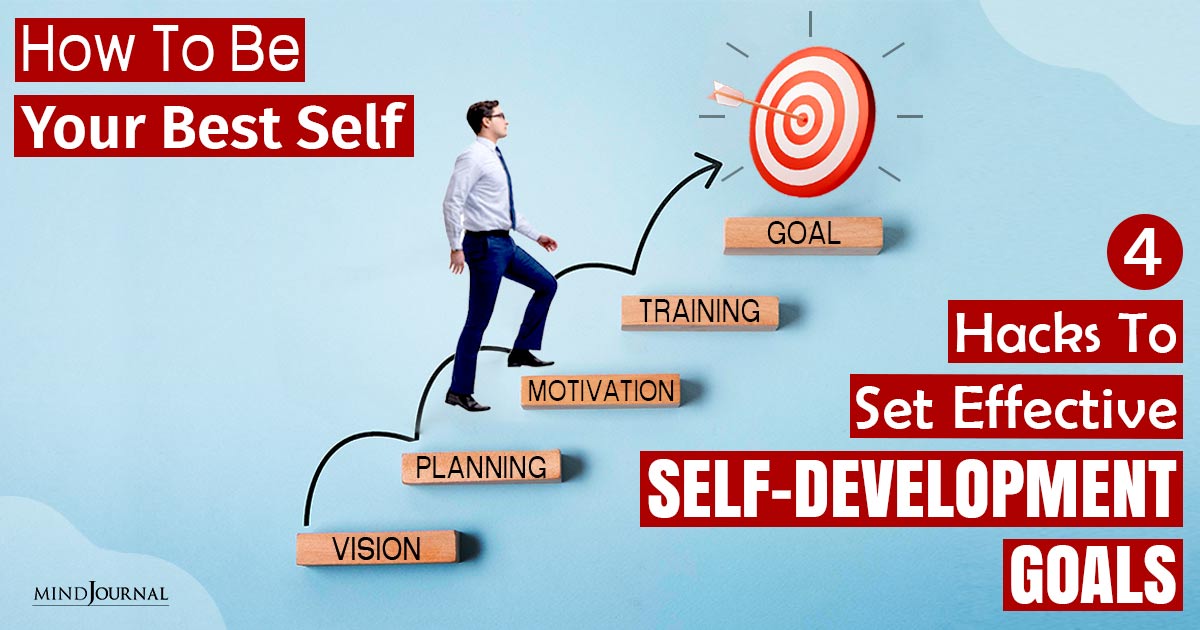

Leave a Reply
You must be logged in to post a comment.